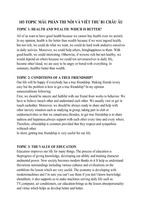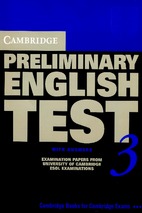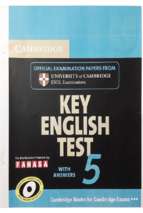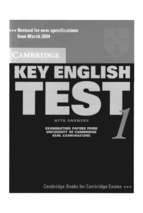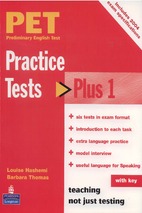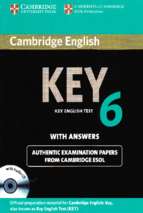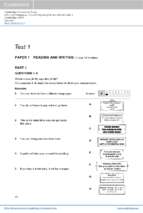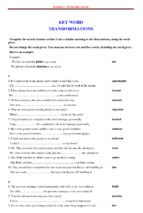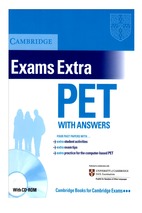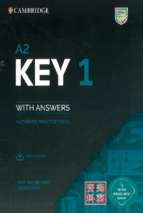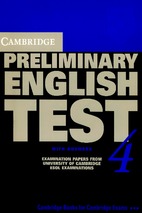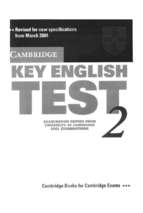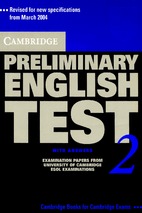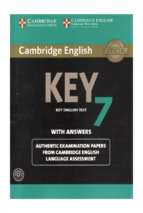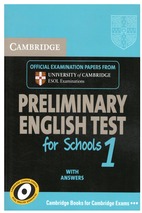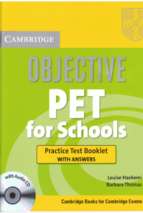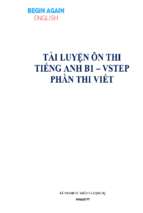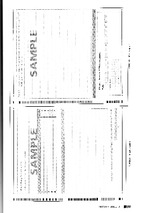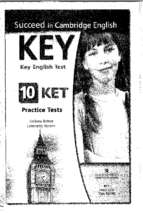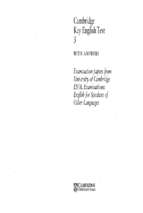CHECK YOUR VOCABULARY FOR
ACADEMIC
ENGLISH
THIRD EDITION
by
David Porter
A & C Black London
www.acblack.com
For Ana Rita
First edition published 2001
Second edition published 2003
This third edition published 2007
by A & C Black Publishers Ltd
38 Soho Square, London W1D 3HB
© Copyright A&C Black Publishers Ltd 2007
All rights reserved.
No part of this publication may be reproduced in
any form without the permission of the publishers.
A CIP entry for this book is available from the British Library
ISBN-10: 0 7136 8285 X ISBN13: 978 0 7136 8285 4 eISBN-
13: 978-1-4081-0232-9
Text typeset by A & C Black
Printed in Great Britain at Caligraving Ltd, Thetford, Norfolk
This book is produced using paper that is made from wood grown in managed, sustainable forests. It is natural, renewable and
recyclable. The logging and manufacturing processes conform to the environmental regulations of the country of origin.
Page Title
Page Title
Unit One
Unit Seven
4
5
6
6
7
8
9
43
43
44
45
46
47
48
1a – Fill in the gaps
1b – Choose the right word
1c – Finish the sentence
1d – Word substitution
1e – Choose the best word
1f – Make a collocation
Vocabulary sheet
Unit Two
10
11
12
13
14
15
16
2a – Fill in the gaps
2b – Choose the right word
2c – Finish the sentence
2d – Word substitution
2e – Choose the best word
2f – Make a collocation
Vocabulary sheet
Unit Three
17
18
19
20
21
22
23
3a – Fill in the gaps
3b – Choose the right word
3c – Finish the sentence
3d – Word substitution
3e – Choose the best word
3f – Make a collocation
Vocabulary sheet
Unit Four
24
24
25
26
27
28
29
4a – Fill in the gaps
4b – Choose the right word
4c – Finish the sentence
4d – Word substitution
4e – Choose the best word
4f – Make a collocation
Vocabulary sheet
Unit Five
30
31
32
33
34
35
23
5a – Fill in the gaps
5b – Choose the right word
5c – Finish the sentence
5d – Word substitution
5e – Choose the best word
5f – Make a collocation
Vocabulary sheet
Unit Six
37
38
38
39
40
41
42
6a – Fill in the gaps
6b – Choose the right word
6c – Finish the sentence
6d – Word substitution
6e – Choose the best word
6f – Make a collocation
Vocabulary sheet
Contents
Contents
7a – Fill in the gaps
7b – Choose the right word
7c – Finish the sentence
7d – Word substitution
7e – Choose the best word
7f – Make a collocation
Vocabulary sheet
Unit Eight
49
49
50
51
52
53
54
8a – Fill in the gaps
8b – Choose the right word
8c – Finish the sentence
8d – Word substitution
8e – Choose the best word
8f – Make a collocation
Vocabulary sheet
Unit Nine
55
56
56
57
58
59
60
9a – Fill in the gaps
9b – Choose the right word
9c – Finish the sentence
9d – Word substitution
9e – Choose the best word
9f – Make a collocation
Vocabulary sheet
Unit Ten
61
61
62
63
63
64
65
10a – Fill in the gaps
10b – Choose the right word
10c – Finish the sentence
10d – Word substitution
10e – Choose the best word
10f – Make a collocation
Vocabulary sheet
Unit Eleven
66
67
68
69
70
71
72
11a – Fill in the gaps
11b – Choose the right word
11c – Finish the sentence
11d – Word substitution
11e – Choose the best word
11f – Make a collocation
Vocabulary sheet
Answer key
73
74
75
Units One to Four
Units Four to Eight
Units Eight to Eleven
76
Index
© A&C Black Publishers Ltd 2007. For reference see Easier English Dictionary for Students (978 07475 6624 3).
1
Introduction
Introduction
The purpose of this book is to help students learn a common core of vocabulary which will be useful for almost
any subject studied at college or university.
Advice to the Student
Obtain a Dictionary
Before attempting to use this book, you will need to obtain a good English-English dictionary, such as the
Easier English Dictionary for Students (ISBN: 978 07475 6624 3) published by A&C Black Publishers Ltd, which
this workbook has been based on.
Using your Dictionary
A dictionary is really a long list of individual words, but in normal situations, words are very rarely used on their
own, appearing instead together with other words. For this reason, the vocabulary you will learn in this book
is presented in example sentences which will help you to understand the words, to remember them more
easily, and to use them correctly.
Doing the Exercises
There are different types of exercise in this book, but one small example will be enough to show you how to
use the book. In these two sentences from Unit One, notice first of all that the other words in these sentences
show you the grammar of these words – here an adjective and then a verb.
1. Although not exactly identical, the two books are so
to each other
that one writer must have copied much of his book from the other.
2. The Prime Minister set up a committee of financial experts to help him discuss
and
new policies.
Working Out the Word or Meaning
Also, notice that the other words in the sentences can help you to guess the meaning of the missing words.
In the examples above, we can see from the phrases not exactly identical and copied much of his book that the
adjective in the first example must mean something like almost the same. In the same way, because the
policies mentioned in the second example are described as new, the verb in the second example seems to
mean plan or prepare:
1. Although not exactly identical, the two books are so
?adj?
that one writer must have copied much of his book from the other.
to each other
2. The Prime Minister set up a committee of financial experts to help him discuss
and
?v?
new policies.
Sample Answers
With the exercise from which these sentences were taken, the words similar (adj) and formulate (v), were
included in the list of answers. Because of the grammar of these words and their meanings – which we can
check in the dictionary if necessary – the completed sentences will look like this:
1. Although not exactly identical, the two books are so similar to each other
that one writer must have copied much of his book from the other.
2. The Prime Minister set up a committee of financial experts to help him discuss
and formulate new policies.
Keep Your Own Notes
Next, whenever you find out what a new word means, write it into your vocabulary notebook, which you can
organise in alphabetical order like a dictionary. With any new word, you should copy either the sentence from
this book or the example from the dictionary. This will help you to learn the word.
2
© A&C Black Publishers Ltd 2007. For reference see Easier English Dictionary for Students (978 07475 6624 3).
When you do look in your dictionary, you may find that one word has many meanings. If you compare these,
however, you will often find that they are not so different from each other, so try to look for one central
meaning.
Introduction
1a – Fill in the
gaps
Words
With Many Meanings
Word That Go Together
Remember also to write down any other words which are often found together with your new word. For
example, notice in your dictionary that we normally use the word to after the word similar (a 'dependent
preposition') and that it is usually policies, plans or programs and so on which are formulated (examples of
'collocations'). This information will help you to use the new words correctly.
To sum up:
decide if the word in the example sentence is a verb, a noun or an adjective
read the other words to help you guess the meaning of the new word
then if necessary use your dictionary to select a suitable answer
if possible, choose one central meaning for the word from the dictionary entry
write down your new word with an example sentence to help you remember its meaning
note down any dependent prepositions or collocations to help you use the word correctly
Advice to the Teacher
The purpose of this book is to equip non-native speakers of English at upper intermediate level and above with
a core of sub-technical vocabulary relevant to the full range of university subjects.
It is envisaged that this book will be used to supplement an English for Academic Purposes/Study Skills course,
at foundation, undergraduate or postgraduate level. It may either be used in class or be assigned for study on
a self-access basis.
The vocabulary items presented here are based on research by I. S. P. Nation*, which culminated in a series of
approximately 800 words ranked in sets according to their frequency of occurrence in texts drawn from a
number of very different academic subjects.
Since the order of the eleven units presented in this book reflect this ranking, the words in Unit One have a
wider range of application than those in Unit Two and so on, which means that students should work through
the book sequentially.
Inside the units, each word is presented in an example sentence which aims firstly to provide a context from
which students may be able to infer the meaning of the word in question and secondly to give instances of
associated words such as collocates and dependent prepositions. This form of presentation will allow students
to find out not only what words mean, but also how to use them.
The exercises include gap-filling, word matching, identifying synonyms, matching sentence fragments, and
word-completion. In all cases, the style and content of the examples I have written are intended to be typical
of language used in academic contexts.
In approaching the exercises, it is vital that students use dictionaries appropriately, and far preferable that they
use an English-English learner's dictionary rather than a translation dictionary. Similarly, it is important that
students do not regard simply filling in blanks as the sole purpose of this book. Instead, students should
approach vocabulary learning actively. This means keeping a vocabulary notebook in which they should be
encouraged to write an example for each new word, with special attention being paid to any dependent
prepositions and collocations.
Although the immediate goal is for students to learn the words here, if it can encourage students to take a
more active, thoughtful approach to vocabulary learning, this book will have succeeded in its wider aim.
*Nation, I. S. P. (1990) Teaching and Learning Vocabulary. Boston, MA: Heinle & Heinle.
3
© A&C Black Publishers Ltd 2007. For reference see Easier English Dictionary for Students (978 07475 6624 3).
Unit One
Introduction
From the following list, use each word only once to complete the sentences below.
Remember that in the case of nouns and verbs you may need to change the form of the
word:
arbitrary (adj)
denote (v)
assign (v)
devise (v)
similar (adj)
4
context (n)
criterion (n)
formulate (v)
summary (n)
ignore (v)
usage (n)
data (n)
impact (n)
vertical (adj)
1.
Although not exactly identical, the two books are so
author must have copied much of his book from the other.
to each other that one
2.
The Prime Minister set up a committee of financial experts to help him discuss and
new policies.
3.
It is often possible to guess the meaning of a word from the other words around it — that is to say,
the
.
4.
In 1990, the British researcher Tim Berners-Lee
paved the way for the development of the World Wide Web.
5.
In newspapers, the layout of the columns is
page horizontally.
6.
The rise in the number of deaths from AIDS has had a very significant
people's sexual behaviour.
7.
The
of drugs has increased significantly in spite of more severe penalties
such as longer prison sentences.
8.
Students should not try to write down everything they hear in a lecture, but just make a
of the most important points.
9.
We use the term "class" to
social and economic backgrounds.
10.
In one case, a murderer may go to prison for life, while another may be set free: it all seems
completely
.
11.
The new journalist was
political parties.
12.
Before we can judge a government's success, we have to decide the
as unemployment, defence or taxation.
13.
One student failed because he completely
paper, although they appeared at the top of every page.
14.
Market researchers use
such as people's spending patterns as well
as information about age and occupation to decide on the most effective marketing strategies.
the first browser, and so
, while the rows run across the
on
groups of people who share the same
to researching the election promises of the main
, such
the instructions on the
Don't forget to keep a record of the words and expressions that you have learnt,
review your notes from time to time and try to use new vocabulary items whenever
possible.
© A&C Black Publishers Ltd 2007. For reference see Easier English Dictionary for Students (978 07475 6624 3).
1.
During the 1970's and 1980's, it became increasingly evident / visible that companies in the West
were uncompetitive.
2.
The United Kingdom makes / publishes more books than any other country.
3.
There has been a major road accident, involving / including 23 cars and 16 lorries.
4.
On the basis of the latest survey, we know that most people have a very negative / bleak view of
politicians and their parties.
5.
In many parts of the world, people are becoming more worried about the danger of pollution and
its effect on the environment / ecology.
6.
Education experts from France travelled to Japan to evaluate / judge the secondary school system
there.
7.
Although it is not very big, the library has an excellent range / variety of books, journals and other
resources for study.
8.
Increasingly, the design of buildings is being adjusted / modified to allow easier access for disabled
people.
9.
The lack of extra student accommodation restricted / narrowed the expansion in student numbers
which the university was planning.
10.
Many students acquire / derive a great deal of enjoyment and satisfaction from their time at
university.
11.
Although the world is getting warmer slowly, the increase in temperature varies / fluctuates from
country to country.
12.
Following the bank raid, the police followed / pursued the robbers but were unable to catch them.
13.
Assessment on this course includes / consists of coursework (30%) and examinations (70%).
Don't forget to keep a record of the words and expressions that you have learnt,
review your notes from time to time and try to use new vocabulary items whenever
possible.
© A&C Black Publishers Ltd 2007. For reference see Easier English Dictionary for Students (978 07475 6624 3).
Unit One
1c – Finish the
sentence
In each
of the sentences below, decide which word in bold is more suitable.
5
Unit One
1b – Choose the right
Choose the best ending for eachword
of the sentence extracts below from the list underneath:
1.
2.
3.
4.
5.
6.
7.
8.
9.
10.
11.
12.
13.
I like your essay, but I want you to illustrate…
What will the result be if in the future we assume…
Students may be asked to compare many alternative…
The Channel Tunnel between France and England was constructed…
Everyone wants to be happy, but we probably all define…
Many universities now have language centres to facilitate…
Numbers and results are not particularly useful in themselves; we need to interpret…
In spite of warnings about cancer, many Westerners equate…
Advertisers use a variety of techniques…
At first, the police viewed the crimes as random…
It may be the case that no solution is possible, given the magnitude…
Although computers are becoming increasingly complex,…
The investigation was stopped because the witnesses could not identify…
a.
b.
c.
d.
e.
f.
g.
h.
i.
j.
k.
l.
m.
…theories, from which they have to select the most convincing.
…happiness in many different ways.
…that nearly everyone has access to a motor car?
…the programs they use are becoming much easier to operate.
…a sun tan with health and youthfulness.
…the man they had seen commit the robbery.
…language learning for international students.
…at a cost of over £8 billion.
…of this problem.
…them to understand what they actually mean.
…events, but realised later that there was a pattern linking them.
…to persuade consumers to buy products and services.
…your points by providing some supporting examples.
1d – Word substitution
From the list below, choose one word which could be used in place of the language shown in bold
without changing the meaning of the sentence. Remember that you may need to change the
form or in some cases the grammatical class of the word:
comply with (v)
conclude (v)
equivalent (adj)
guarantee (n)
imply (v)
method (n)
obvious (adj)
presume (v) proceed (v)
require (v)
specify (v)
sum (n)
1.
If a company does not observe health and safety laws, it may be fined very
heavily if any of its workers are injured.
2.
For many years, $4 was equal to £1.
3.
University regulations state that students must pass 18 modules to
graduate.
4.
Anybody driving a car is obliged by law to have insurance.
6
© A&C Black Publishers Ltd 2007. For reference see Easier English Dictionary for Students (978 07475 6624 3).
5.
On the basis of their examination results, it was clear that most students had
completely misunderstood the first part of the paper.
6.
Many people think that oil will run out in the next 100 years, but they are
assuming that we will continue to use oil at the same rate as today.
7.
Most electrical products have a one- or two-year warranty in case
something should go wrong.
8.
One problem facing overseas students is adapting to new teaching
techniques.
9.
The fact that crime increases when unemployment goes up seems to
suggest a link between the two.
10.
It may cost an overseas student around £15,000 per year to live and study in
Britain, which is a very large amount of money.
11.
The lecturer gave the students a 10 minute break before continuing with
the rest of her lecture.
12.
At the end of her talk, the lecturer finished with a brief review of the main
points.
Unit One
1f – Make a collocation
1e – Choose the best word
For each of the sentences here, choose the best word from a, b or c:
1.
2.
3.
4.
5.
6.
7.
8.
9.
10.
11.
12.
13.
In this first assignment, we will
your work and then give you detailed
feedback on how to improve your writing.
a. assess
b. judge
c. measure
In a seminar or tutorial, everyone should take part rather than allow one person to
the discussion.
a. overwhelm
b. dominate
c. oppress
Although it is impossible to give a
age, we believe that the woman
was between 25 and 30 when she died.
a. definite
b. certain
c. absolute
Rather than try to treat it, the best
to the problem of poor public
health may be to attempt to prevent it.
a. way
b. method
c. approach
Surprisingly perhaps, the biggest
health risk for tourists travelling
abroad is actually road traffic accidents.
a. potential
b. possible
c. theoretical
Water is made up of two
, namely oxygen and hydrogen.
a. sections
b. aspects
c. elements
Computers can be difficult to repair because there may be hundreds of different
inside.
a. components
b. pieces
c. parts
Because Paris is expensive, many organisations pay higher salaries to
for the
high cost of living there.
a. compensate
b. adjust
c. redress
Many people were killed instantly at Hiroshima and Nagasaki, but thousands more died from
radiation sickness.
a. succeeding
b. following
c. subsequent
The clothing of men and women used to be quite
, whereas today
women often wear trousers as well as men.
a. distinct
b. diverse
c. distinguished
Research
that customers want free car-parking when they go shopping.
a. claims
b. indicates
c. points out
In political terms, the Middle East is one of the most unstable
of the
world.
a. locations
b. places
c. regions
The
cause of death today in Britain is heart disease, with cancer in
second place.
a. first
b. prime
c. initial
© A&C Black Publishers Ltd 2007. For reference see Easier English Dictionary for Students (978 07475 6624 3).
7
Start by reading through the sentences below. Then take one word from the box on the left and
combine this with one from the box on the right to make a collocation. For example, valid can be
joined with reason. (Note that more than one pairing may be possible and also that some words
appear more than once.) Then try to match your combinations with the spaces in the sentences
below:
8
© A&C Black Publishers Ltd 2007. For reference see Easier English Dictionary for Students (978 07475 6624 3).
Unit One
new
analyse
leading
1f –ultimate
Make
a
collocation
valid
marital
establish
reverse
minimum
new
tense
status
responsibility
concept
the hypothesis results
dimension temperature
initial
constant
put forward
role
reason
a link
atmosphere
results
the verdict
requirement
1.
If you submit work late, you will lose marks and may even be given a fail grade, unless you have a
such as illness.
2.
One travel company is now advertising a completely
tourism: flights into outer space by rocket.
3.
At the bottom of the ocean, the water remains at a
irrespective of changing weather conditions at the surface.
4.
The growth of China will add a
political situation in the Far East.
5.
Students are expected not just to describe what they have done but also to
when they write a research report.
6.
Investigators have been able to
and industrial pollution.
7.
Following the demonstrations by thousands of students, there was a very
in the capital, with many choosing to leave the city and head for the
countryside.
8.
Unfortunately, although the
project failed in the long run because of a lack of interest.
9.
Engineers have played a
us clean water supplies, perhaps more so than doctors.
10.
The Managing Director may run the company, but
with the Board of Directors.
11.
On the form, please give your name, nationality, address and indicate your
.
When some scientists originally
known as global warming,
the idea was not taken seriously, and yet today it is accepted by nearly everyone.
12.
in
to the economic and
between childhood illnesses
were very promising, the
in improving our health by giving
rests
13.
In some instances, a Court of Appeal may
first trial and released somebody who has been wrongly held in prison.
reached at the
14.
Most universities require international students to have an IELTS score of at least 6 as a
for English language competence.
9
© A&C Black Publishers Ltd 2007. For reference see Easier English Dictionary for Students (978 07475 6624 3).
Don't forget to keep a record of the words and expressions that you have learnt,
review your notes from time to time and try to use new vocabulary items whenever
possible.
Unit One
Vocabulary sheet
Unit Two
Vocabulary sheet
From the following list, use each word only once to complete the sentences below. Remember that
in the case of nouns and verbs you may need to change the form of the word:
achieve (v)
ensue (v)
automatic (adj)
equilibrium (n)
conceive (v)
manipulate (v) mathematics (n)
innovative (adj)
section (n)
create (v)
period (n)
series (n)
stable (adj)
precede (v)
tradition (n)
1.
In order to be successful, some politicians
want.
other people to get what they
2.
Japanese and Korean companies have invested heavily in the UK,
thousands of new jobs.
3.
The Internet was first
together.
4.
Serious unrest and rioting
the election.
5.
Since consumers are always demanding new products, companies which can be
are more likely to succeed.
6.
Most planes today are controlled not by human pilots but by a computer system known as an
pilot, which is even responsible for taking off and landing.
7.
Most employers insist that their employees have qualifications in English and
8.
Some academics have argued that standards have been falling because more students are
first class degrees.
9.
Over a
10.
The price of a product will not change if there is
demand for that product.
11.
By
married couple.
12.
In addition to the regular lectures, we have a
speakers from other universities.
13.
Although the arrival of coffee in Britain
which is the more popular today.
14.
Reports are usually divided into separate
and 'Conclusions.'
15.
After a very difficult night, his blood pressure became
were allowed to visit him.
of as a way of linking computers in the USA
as a result of the decision to ignore the result of
.
of twenty years, the economy grew at an average of 8% per year.
between the supply and the
, wedding guests in most cultures give presents or money to the newly-
of public lectures given by guest
that of tea, it is the second drink
with headings such as 'Findings'
again and his family
10
© A&C Black Publishers Ltd 2007. For reference see Easier English Dictionary for Students (978 07475 6624 3).
In each of the sentences below, decide which bold word is more suitable.
1.
A new moon occurs / takes place every 28 days.
2.
Students should not be inert / passive but should try instead to contribute as much as possible to
Unit Two
2c – Finish the sentence
discussions in seminar groups.
3.
On the first day, the course director and the subject tutor explained their respective / single roles
to the new students.
4.
It is now possible to infer / imply a link between using mobile phones and contracting some forms
of cancer.
5.
The fact that population growth is still accelerating / catching up is one of the most important
problems we face.
6.
Most universities need to earn money from private sources, but the important / major part of their
funding still comes from the government.
7.
Expenditure on weapons such as guns, tanks and aeroplanes consumes a large piece / portion of a
country's wealth.
8.
Because foreign exchange rates ebb and flow / fluctuate, it is not always possible for exporters to
know how much money they will receive from sales.
9.
Member countries award / contribute money to the United Nations to pay for the running of the
organization.
10.
The main concentration / focus of Greenpeace is on problems concerning pollution.
11.
Although their plan / design was often very good, the quality of many British cars tended to be
poor.
12.
Although it is very expensive, it is possible to convert / exchange other forms of carbon into
diamonds.
13.
Prehistoric man could not think / comprehend why the moon appears to grow bigger and then
smaller each month.
14.
In some situations, a law court can authorise / let the police to enter a house without the owner's
permission.
Don't forget to keep a record of the words and expressions that you have learnt,
review your notes from time to time and try to use new vocabulary items whenever
possible.
© A&C Black Publishers Ltd 2007. For reference see Easier English Dictionary for Students (978 07475 6624 3).
11
Unit Two
2b – Choose the right word
Choose the best ending for each of the sentence extracts below from the list underneath:
1.
In 1905, Einstein published the first part of his theory…
2.
Environmentalists point out that electric cars just shift…
3.
Most metals expand…
4.
As a result of the intense…
5.
Fifty years ago, most smokers were not aware…
6.
The new grading machine has the function…
7.
In many universities, there is a coffee bar adjacent…
8.
After studying for two hours, it becomes difficult to concentrate…
9.
Some children show a great deal of maturity…
10.
Sadly, according to government statistics,…
11.
In the seventeenth century, Galileo demonstrated…
12.
In the 1980's, the US and Soviet governments made the crucial…
13.
Politicians often complain that newspapers distort…
14.
The history of the Americas is usually from seen from the perspective…
15.
An already difficult operation was complicated…
a.
…of the dangers of smoking.
b.
…at a young age, while others may continue to be irresponsible.
c.
…to the library where students can take a break.
d.
…the pollution problem from the car itself to the electricity station.
e.
…that all objects (heavy or light) fall at the same speed.
f.
…heat of the fire, the front half of the train was completely destroyed.
g.
…what they say so that the readers cannot read the truth.
h.
…of relativity, which completely changed our ideas of time and space.
i.
…of the European immigrants, rather than from that of the original inhabitants.
j.
…on your work and so it is a good idea to take a break.
k.
…when they are heated.
l.
…of separating the larger pieces of metal from the smaller pieces.
m.
…over 30% of marriages end in divorce within five years.
n.
…decision to reduce the number of atomic weapons.
o.
…by the fact that the patient had a history of heart disease.
12
© A&C Black Publishers Ltd 2007. For reference see Easier English Dictionary for Students (978 07475 6624 3).
From the list below, choose one word which could be used in place of the language shown in bold
without changing the meaning of the sentence. Remember that you may need to change the form
or in some cases the grammatical class of the word:
affect (v)
expose (v)
predict (v)
capillary (n)
generate (v)
select (v)
notion (n)
decade (n)
consequent (adj)
signify (v)
Unit Two
2e – Choose the best word
emphasise (v)
pertinent (adj)
structure (n)
1.
Over the previous ten years, we have seen an enormous growth in the
number of home personal computers.
2.
Lecturers often speak more loudly and more slowly when they want to
stress an important point.
3.
One important function of newspapers is to uncover dishonest behaviour
and wrong-doing by those in power.
4.
The organisation of the company has changed completely, with far fewer
senior managers.
5.
The decision to give longer prison sentences indicated a hardening of the
government's attitude towards drug offenders.
6.
The new computer system created a lot of interest among potential
customers.
7.
When the government increased the tax on petrol, there was a resultant
rise in transport costs.
8.
In the first instance, the blood passes out of the heart, through the lungs
and along the arteries before reaching the small blood vessels within the
skin.
9.
Until the sixteenth century, the idea that the Earth moves around the Sun
was regarded as a ridiculous idea, whereas today we accept this concept
as completely normal.
10.
Pollution is a problem which has an effect on every country today.
11.
Most economists forecast that China will become a leading world
economy in the twenty-first century.
12.
One difficult aspect of writing an essay is selecting material which is
relevant to the topic and excluding irrelevant information.
13.
The company has experienced a number of significant changes in the last
few years.
14.
The first thing to do is to choose the courses which you would like to
study and then look at each university prospectus.
undergo (v)
Don't forget to keep a record of the words and expressions that you have learnt,
review your notes from time to time and try to use new vocabulary items whenever
possible.
© A&C Black Publishers Ltd 2007. For reference see Easier English Dictionary for Students (978 07475 6624 3).
13
Unit Two
2d – Word substitution
For each of the sentences here, choose the best word from a,b or c:
1.
Although he had no
bleeding.
a. outside
injuries, doctors later found that he was suffering from internal
b. external
c. outlying
2.
There is a marked
between the poverty of the poorest members of society and the
affluence of the richest.
a. opposite
b. contrast
c. variation
3.
The allied forces launched
bombing raids on several important sites in and around
the enemy capital.
a. simultaneous
b. contemporary
c. coincidental
4.
Students are often advised to look at the first and last
to read it in detail.
a. headings
b. chapters
c. titles
5.
Although this is far from certain, the
a. approximate
b. general
age of the universe is about 4.6 billion years.
c. rough
6.
Some economists argue that new
allows more jobs to be created.
a. science
b. engineering
causes unemployment while others feel that it
of a book before attempting
c. technology
7.
After you have submitted your application, the university will attempt to
information you have supplied is correct.
a. verify
b. certify
c. investigate
8.
Young children go through a
everything they hear.
a. process
b. phase
that the
in their development when they try to copy
c. transition
9.
In the some countries, there is no tax on books on the
be taxed.
a. principle
b. idea
c. concept
10.
Further information can be
a. obtained
b. found
11.
As everyone knows, certain metals such as iron and steel can have a
others like copper cannot.
a. electrical
b. magnetic
c. chemical
12.
Just as dividing up an orange into
longer piece of text into small blocks of words.
a. segments
b. pieces
that education should not
from the nearest British Council office.
c. got
field while
makes it easier to eat, always try to break up a
c. sections
13.
One problem for any teacher is that each student has his/her own
a. separate
b. individual
c. distinctive
14.
Good theories are important of course, but we must have
them.
a. empirical
b. true
c. realistic
needs.
evidence to support
14
© A&C Black Publishers Ltd 2007. For reference see Easier English Dictionary for Students (978 07475 6624 3).
Vocabulary sheet
Start by reading through the sentences below. Then take one word from the box on the left and
combine this with one from the box on the right to make a collocation. (Note that more than one
pairing may be possible and also that some words appear more than once.) Then try to match your
combinations with the spaces in the sentences below:
15
© A&C Black Publishers Ltd 2007. For reference see Easier English Dictionary for Students (978 07475 6624 3).
events
sophisticated
angrily
2f
–
Make
a
collocation
highly
signals
species
feasible
sequence of
separate
devote
transmit
assert
inhibit
precise
reacted
verbal
natural
details
agreement
entities
economically
growth
the right
phenonema
time and money
1.
In spite of advances in technology, we are still at risk from
such as earthquakes and floods.
2.
One threat facing companies today is
who break into the most advanced computer systems.
computer 'hackers'
3.
The accident was the result of a tragic
been prevented with better safety procedures.
which could have
4.
The company
unsafe.
5.
There is considerable doubt over whether the proposal by the American government for a manned
trip to Mars is technically and
6.
Tigers (and other large cats) are now an
disappear altogether in the future.
7.
After the Second World War, African nations started to
become independent.
8.
In law, a
contract, is still a contract.
9.
While she refused to give any
several people had been arrested.
10.
In order to produce new medicines, drug companies have to
on a huge scale to their research and development activities.
11.
Most economists believe that high taxes
12.
In spite of its age, the satellite is still continuing to
13.
Are the mind and body the same thing or are they two
to the suggestion that its products were
and may
to
even though it is not written down like a formal
, the Minister admitted that
in the economy.
to Earth.
?
16
© A&C Black Publishers Ltd 2007. For reference see Easier English Dictionary for Students (978 07475 6624 3).
Unit Two
endangered
- Xem thêm -

